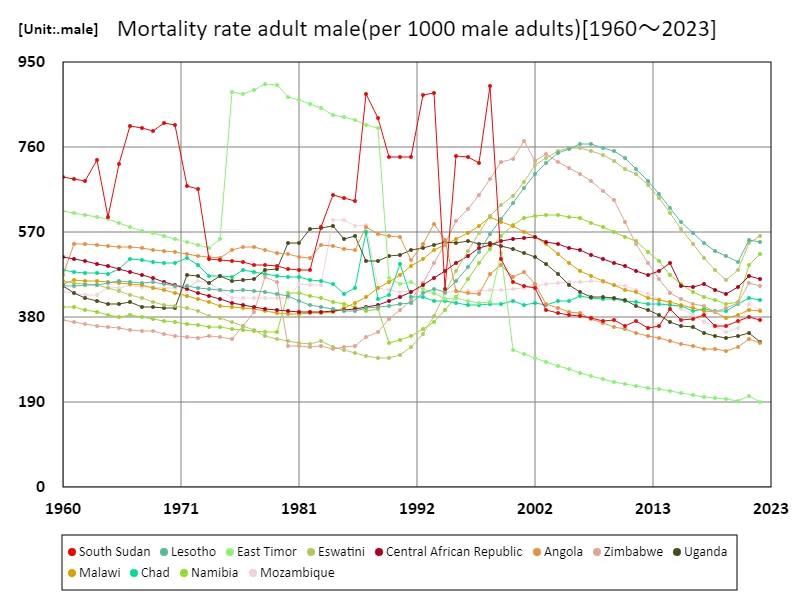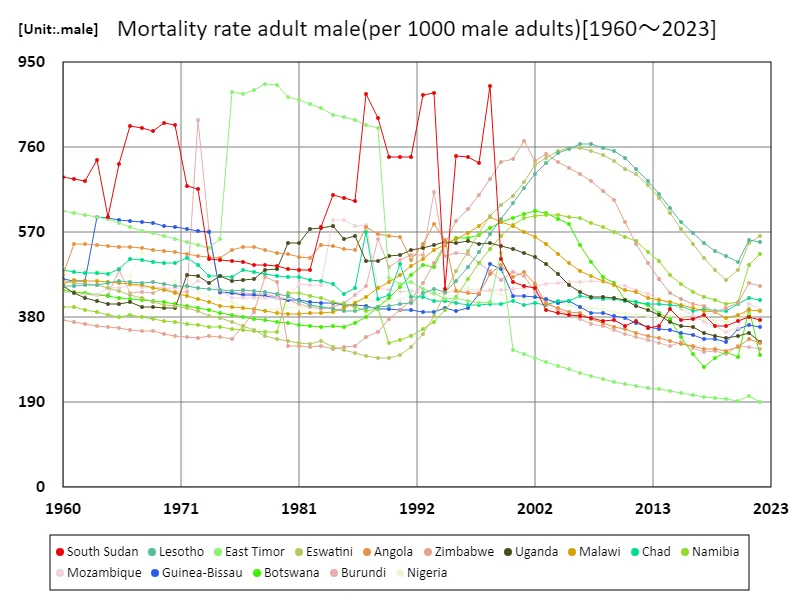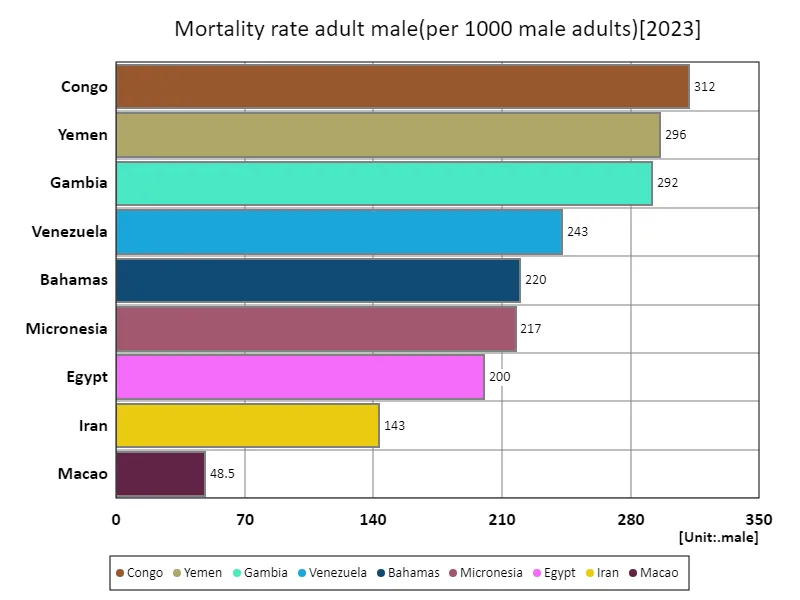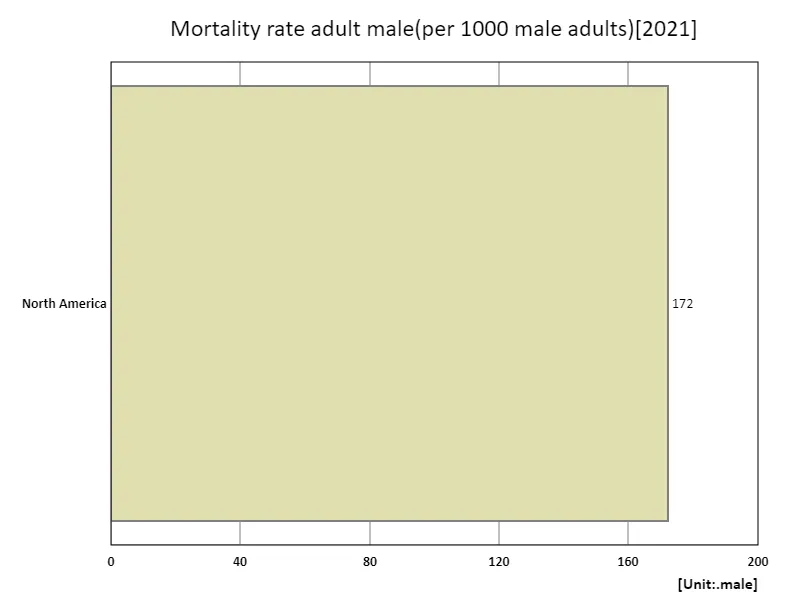Abstract
Past trends in global birth rates show significant regional variation. In the 20th century, high birth rates were common in developing countries, driven by limited access to contraception, lower life expectancy, and agricultural economies. Over time, many countries experienced a decline in birth rates, especially in developed nations, due to urbanization, improved healthcare, and women’s education. However, regions like Sub-Saharan Africa, including Niger, have maintained high fertility rates due to cultural, economic, and demographic factors, with projections for Niger’s rate to remain the highest by 2050.
Deaths among adult males (per 1,000 males)
From 1960 to 2050, global birth rates and life expectancy have shown diverse trends. In 1986, Yemen experienced its highest birth rate of 8.86 births per woman, driven by high fertility and lower healthcare access. Over time, fertility rates have generally declined worldwide due to improved healthcare, education, and urbanization. Yemen’s birth rate has since decreased significantly, now at 28.9% of its peak. This shift mirrors global patterns, where countries with high fertility rates in the 20th century have seen reductions, while life expectancy has risen due to better healthcare and living conditions.


The maximum is 901male[1978] of East Timor, and the current value is about 21.1%
Deaths among adult males (per 1,000 men) (worldwide)
From 1960 to 2050, global birth rates have evolved significantly. In 1986, Yemen recorded its highest fertility rate of 8.86 births per woman, reflecting high mortality rates and limited healthcare access. Since then, fertility rates have generally declined worldwide due to improved healthcare, urbanization, and greater access to family planning. Yemen’s rate has dropped to 28.9% of its peak, illustrating a broader trend of reduced fertility in developing nations. Globally, many countries have shifted to lower birth rates, while life expectancy has risen, driven by advancements in health and living conditions.


The maximum is 901male[1978] of East Timor, and the current value is about 21.1%
Deaths among adult males (per 1,000 men) (worldwide, latest year)
From 1960 to 2050, global fertility rates have undergone significant changes. In 2050, Niger is projected to have the highest birth rate at 4.25 births per woman, reflecting the country’s slower pace of demographic transition. The global average is expected to be 2.01, near replacement level. Historically, high fertility rates were common in developing regions due to limited access to healthcare and family planning. Over time, as education and healthcare improved, many countries, particularly in the developed world, saw sharp declines in birth rates. These trends highlight regional disparities in fertility and economic development.


The maximum is 312male of Congo, the average is 219male, and the total is 1.97kmale
Deaths among adult males (per 1,000 males) (region, latest year)
In 2022, the Central African Republic recorded a shockingly high male mortality rate of 465 deaths per 1,000 men, reflecting severe health and social challenges. These include ongoing civil war, political instability, a lack of healthcare infrastructure, and the spread of infectious diseases. The global average was 254, with 2,790 total deaths, showing significant regional disparities. While countries with robust healthcare systems and stability experienced lower mortality rates, areas plagued by conflict and weak health systems remain vulnerable. Historically, medical advancements have lowered global mortality, but high rates persist in conflict zones. Strengthening public health efforts in these regions is crucial.


The maximum is 172male of North America, the average is 172male, and the total is 172male
Main data
| Mortality rate adult male(per 1000 male adults, Death rate and number) [male] | ||||||||||
|---|---|---|---|---|---|---|---|---|---|---|
| Eswatini | Lesotho | Namibia | Central African Republic | Zimbabwe | Chad | South Africa | Kenya | Mozambique | Nauru | |
| 2023.0 | ||||||||||
| 2022.0 | 561.02 | 549.17 | 521.27 | 465.19 | 449.36 | 418.78 | 416.31 | 407.93 | 397.26 | 394.8 |
| 2021.0 | 545.72 | 552.67 | 496.22 | 472.34 | 456.32 | 423.49 | 399.44 | 419.4 | 409.38 | 398 |
| 2020.0 | 484.63 | 504.36 | 415.24 | 448.54 | 412.65 | 408.62 | 353.93 | 389.65 | 355.09 | 404.43 |
| 2019.0 | 464.46 | 516.42 | 409.25 | 431.28 | 400.48 | 393.34 | 341.84 | 381.95 | 347.81 | 403.61 |
| 2018.0 | 485.25 | 529.3 | 419.62 | 441.58 | 391.37 | 394.25 | 360.38 | 389.76 | 359.78 | 405.66 |
| 2017.0 | 511.74 | 546.7 | 425.56 | 454.78 | 405.93 | 399.14 | 369.71 | 391.56 | 368.92 | 409.1 |
| 2016.0 | 543.61 | 568.27 | 436.57 | 447.19 | 409.21 | 394.84 | 381.4 | 386.59 | 384.26 | 412.71 |
| 2015.0 | 577.3 | 593.38 | 454.91 | 450.39 | 419.83 | 405.94 | 392.51 | 394.21 | 397.89 | 419.6 |
| 2014.0 | 612.95 | 623.9 | 475.48 | 501.31 | 435.08 | 406.88 | 403 | 389.77 | 410.27 | 427.17 |
| 2013.0 | 645.74 | 655.4 | 505.34 | 484.38 | 465.99 | 409.91 | 419.53 | 387.99 | 420.95 | 437.64 |
| 2012.0 | 674.86 | 684.94 | 526.75 | 474.8 | 501.96 | 408.93 | 432.36 | 394.74 | 433.07 | 445.47 |
| 2011.0 | 699.43 | 711.23 | 550.47 | 482.93 | 544.86 | 414 | 457.71 | 393.03 | 441.54 | 451.33 |
| 2010.0 | 711.24 | 735.93 | 560.47 | 494.55 | 593.69 | 417.44 | 482.72 | 392.74 | 448.88 | 462.85 |
| 2009.0 | 728.4 | 752.69 | 571.57 | 502.29 | 641.97 | 419.9 | 509.69 | 396.38 | 451.5 | 471.41 |
| 2008.0 | 742.6 | 758.65 | 581.9 | 510.45 | 662.14 | 420.37 | 526.72 | 401.17 | 458.46 | 477.91 |
| 2007.0 | 752.83 | 768.47 | 590.57 | 519.69 | 684.2 | 422.43 | 539.73 | 402.78 | 460.12 | 483.25 |
| 2006.0 | 758.42 | 767.86 | 601.47 | 530.93 | 700.91 | 428.05 | 545.46 | 412.38 | 458.58 | 485.99 |
| 2005.0 | 758.01 | 756 | 604.19 | 535.91 | 714.68 | 416.28 | 544.07 | 421.68 | 458.42 | 490.03 |
| 2004.0 | 750.86 | 746.71 | 609.69 | 542.99 | 726.95 | 415.44 | 543.77 | 435.01 | 456.08 | 490.72 |
| 2003.0 | 735.6 | 724.95 | 608.34 | 548.61 | 744.55 | 407.94 | 539.33 | 446.14 | 453.91 | 491.59 |
| 2002.0 | 721.13 | 700.36 | 605.94 | 559.38 | 728.77 | 411.05 | 514.91 | 452.23 | 450.49 | 489.22 |
| 2001.0 | 682.13 | 670.05 | 601.81 | 556.46 | 774.86 | 408.13 | 489.67 | 456.28 | 445.99 | 482.83 |
| 2000.0 | 652.02 | 636.15 | 586.28 | 555.89 | 733.17 | 417.05 | 472.93 | 451.01 | 443.67 | 476.19 |
| 1999.0 | 631.3 | 600.71 | 562.01 | 549.58 | 727.64 | 410.4 | 448.28 | 446.39 | 441.46 | 479.18 |
| 1998.0 | 605.51 | 566.71 | 533.51 | 542.03 | 688.33 | 410.79 | 434.46 | 440.75 | 441.51 | 469.08 |
| 1997.0 | 569.06 | 526.82 | 500.64 | 533.94 | 652.46 | 406.43 | 420.18 | 431.57 | 439 | 460.16 |
| 1996.0 | 528.73 | 492.52 | 465.73 | 517.9 | 622.4 | 408.45 | 408.42 | 419.77 | 438.55 | 439.77 |
| 1995.0 | 483.87 | 462.13 | 426.41 | 500.69 | 596.06 | 411.44 | 384.63 | 404.83 | 439.07 | 427.78 |
| 1994.0 | 433.55 | 436.25 | 396.53 | 483.66 | 544.15 | 415.45 | 380.12 | 389.93 | 434.62 | 424.87 |
| 1993.0 | 383.93 | 443.48 | 370.57 | 466.73 | 500.8 | 416.23 | 374.25 | 384 | 432.92 | 429.57 |
| 1992.0 | 342.59 | 433.76 | 353.01 | 451.33 | 457.51 | 424.28 | 362.52 | 373.11 | 437.09 | 424.74 |
| 1991.0 | 313.96 | 412.26 | 338.59 | 436.72 | 419.33 | 424.47 | 361.68 | 354.01 | 438.96 | 420.19 |
| 1990.0 | 296.64 | 410.44 | 328.21 | 424.99 | 396.18 | 499.51 | 346.74 | 340.67 | 437.26 | 415.84 |
| 1989.0 | 288.1 | 404.58 | 321.86 | 415.78 | 375.22 | 429.17 | 336.4 | 329.21 | 441.5 | 411.43 |
| 1988.0 | 289.44 | 402.29 | 397.84 | 408.51 | 347.71 | 421.15 | 331.26 | 319.2 | 444.45 | 410.43 |
| 1987.0 | 294.47 | 399.95 | 393.03 | 402.95 | 335.4 | 569.7 | 327.49 | 304.39 | 587.05 | 406.56 |
| 1986.0 | 299.91 | 393.15 | 403.4 | 398.79 | 316.94 | 445.4 | 326.37 | 298.4 | 583.33 | 401.72 |
| 1985.0 | 306.53 | 393.78 | 408.97 | 395.79 | 312.66 | 432.17 | 329.02 | 290.06 | 596.82 | 396.52 |
| 1984.0 | 312.99 | 398.42 | 414.65 | 393.73 | 310.08 | 455.31 | 333.2 | 277.58 | 598.56 | 391.25 |
| 1983.0 | 327.33 | 403.76 | 422.86 | 392.52 | 316.3 | 460.89 | 338.36 | 269.99 | 452.61 | 383.3 |
| 1982.0 | 319.72 | 407.82 | 427.01 | 392.08 | 312.53 | 463.32 | 343.03 | 271.14 | 452.88 | 378.23 |
| 1981.0 | 323.3 | 416.5 | 433.34 | 391.67 | 314.79 | 469.13 | 349.38 | 265.59 | 454.12 | 373.92 |
| 1980.0 | 326.38 | 426.71 | 434.16 | 393.37 | 315.6 | 470.14 | 353.01 | 307.04 | 423.4 | 382.04 |
| 1979.0 | 330.4 | 433.06 | 348.1 | 395.27 | 459.74 | 473.06 | 356.88 | 322.82 | 423.53 | 378.65 |
| 1978.0 | 339.15 | 436.71 | 347.34 | 398.01 | 469.42 | 477.75 | 360.21 | 338.85 | 422.04 | 375.07 |
| 1977.0 | 350.74 | 439 | 350.12 | 402.02 | 390.9 | 482.27 | 364.76 | 338.61 | 423.44 | 369.66 |
| 1976.0 | 360.06 | 441.39 | 352.52 | 406.99 | 360.72 | 485.47 | 369.01 | 339.56 | 423.22 | 366.18 |
| 1975.0 | 369.15 | 439.19 | 354.72 | 412.98 | 331.11 | 470.87 | 374.53 | 326.24 | 422.18 | 374.69 |
| 1974.0 | 377.78 | 441.97 | 357.4 | 420.03 | 335.14 | 472.12 | 377.38 | 331.94 | 440.12 | 370.01 |
| 1973.0 | 383.76 | 442.22 | 358.2 | 427.65 | 338.52 | 472.64 | 380.43 | 327.33 | 456.78 | 375.75 |
| 1972.0 | 393.29 | 444.41 | 362.23 | 434.98 | 332.67 | 496.78 | 386.22 | 341.74 | 460.37 | 371.28 |
| 1971.0 | 399.73 | 450.18 | 365.53 | 443.36 | 336.68 | 512.19 | 387.79 | 350.72 | 445.36 | 368.01 |
| 1970.0 | 404.37 | 450.48 | 369.3 | 451.47 | 338.45 | 500.69 | 390.8 | 355.95 | 445.42 | 371.42 |
| 1969.0 | 408.47 | 453.48 | 372.41 | 459.45 | 343.65 | 501.46 | 394.56 | 358.68 | 445.85 | 366.79 |
| 1968.0 | 413.38 | 458.49 | 375.96 | 467.17 | 349.07 | 502.89 | 397.35 | 363.68 | 448.2 | 364.48 |
| 1967.0 | 422.33 | 457.7 | 380 | 474.6 | 349.57 | 508.39 | 399.22 | 363.42 | 448.76 | 365.48 |
| 1966.0 | 430.12 | 457.97 | 386.22 | 481.76 | 352.19 | 510.87 | 399.25 | 366.56 | 451.12 | 363.26 |
| 1965.0 | 439.74 | 461.09 | 380.48 | 488.25 | 355.01 | 487.7 | 399.32 | 371.92 | 446.54 | 360.03 |
| 1964.0 | 446.25 | 455.64 | 384.53 | 494.38 | 358.8 | 477.38 | 402.01 | 372.76 | 446.71 | 362.71 |
| 1963.0 | 452.67 | 452.63 | 391.89 | 499.73 | 361.35 | 478.97 | 404.31 | 376.66 | 430.56 | 360.99 |
| 1962.0 | 453.42 | 451.39 | 395.69 | 505.16 | 366.06 | 479.18 | 405.39 | 380.14 | 430.08 | 358.2 |
| 1961.0 | 457.65 | 450.43 | 402 | 510.54 | 369.92 | 482.08 | 406.77 | 384.82 | 433.58 | 362.76 |
| 1960.0 | 461.56 | 449.95 | 403.74 | 515.84 | 374 | 485.33 | 409.63 | 391.69 | 436.14 | 361.77 |



Comments